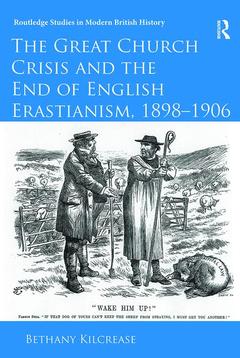The Great Church Crisis and the End of English Erastianism, 1898-1906 John Crawfurd and the Politics of Equality Routledge Studies in Modern British History Series
Auteur : Kilcrease Bethany

This book traces the history of the "Church Crisis", a conflict between the Protestant and Anglo-Catholic (Ritualist) parties within the Church of England between 1898 and 1906. During this period, increasing numbers of Britons embraced Anglo-Catholicism and even converted to Roman Catholicism. Consequent fears that Catholicism was undermining the "Protestant" heritage of the established church led to a moral panic.
The Crisis led to a temporary revival of Erastianism as protestant groups sought to stamp out Catholicism within the established church through legislation whilst Anglo-Catholics, who valued ecclesiastical autonomy, opposed any such attempts. The eventual victory of forces in favor of greater ecclesiastical autonomy ended parliamentary attempts to control church practice, sounding the death knell of Erastianism. Despite increased acknowledgment that religious concerns remained deep-seated around the turn of the century, historians have failed to recognize that this period witnessed a high point in Protestant-Catholic antagonism and a shift in the relationship between the established church and Parliament. Parliament?s increasing unwillingness to address ecclesiastical concerns in this period was not an example advancing political secularity. Rather, Parliament?s increased reluctance to engage with the Church of England illustrates the triumph of an anti-Erastian conception of church-state relations.
Terminological Preface
Acknowledgments
List of Abbreviations
1 Introduction
2 The Church Crisis and Erastianism
3 Never Trust a Clergyman in Black: British Anti-Catholicism during the Great Church Crisis
4 William Harcourt’s Protestant Erastianism: Church and State, 1898–1900
5 Protestant Paranoia and Catholic Conspiracies: Protestant and Catholic Perspectives on the Second Anglo-Boer War, 1899–1902
6 Arthur Balfour and coming the Triumph of Ecclesiastical Independence, 1898–1902
7 A New Front in the Church Crisis: The 1902 Education Act
8 The Royal Commission on Ecclesiastical Discipline, another Education Bill, and the Implosion of Erastianism
9 Conclusion
Appendix
Bibliography
Index
Bethany Kilcrease is an Associate Professor of History at Aquinas College in Grand Rapids, Michigan. She has written and spoken on late-Victorian Anglicanism and parliamentary politics, Protestant responses to the Boer war, anti-Catholicism in popular literature, and the role of Victorian Catholic apologists in popularizing science.
Date de parution : 06-2018
15.6x23.4 cm
Date de parution : 12-2016
15.6x23.4 cm
Thèmes de The Great Church Crisis and the End of English... :
Mots-clés :
Church Crisis; Young Man; Catholic; Vice Versa; Catholicism; Simple Bible Teaching; Nineteenth-Century; John Crawfurd; Protestant; Protestant Party; Church Association; Church of England; John Kensit; Protestant–Catholic antagonism; Lady Wimborne; political secularity; Prayer Book Controversy; English Erastianism; Evangelical Anglicans; Revised Prayer Book; Layman’s League; Trust Deed; Public Worship Regulation Act; Primrose League; Enabling Act; Denominational Teaching; United Free Church; Voluntary Schools; Loyal Orange Institution; Benefice Bill; Cowper Temple Clause; Eucharistic Vestments; Church State Relations



